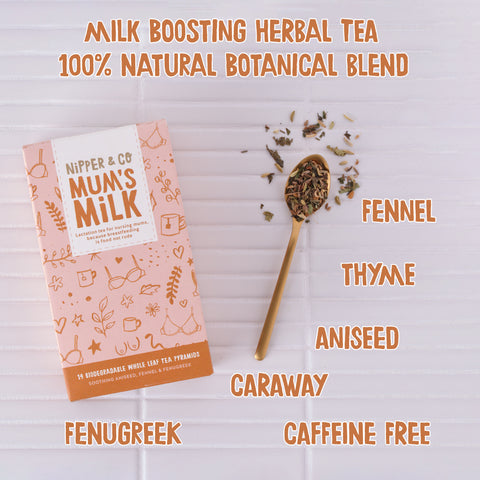Mum’s Milk breastfeeding tea and Functional Herbs
Breastfeeding is a critical phase for both the mother and the new-born, providing numerous health benefits and establishing a strong bond between them. However, some breastfeeding mothers may encounter challenges in maintaining an adequate milk supply. Here we will explore botanicals, used in our Mum's Milk herbal infusion, with long standing tradition of use by breastfeeding mothers and science behind them.
1. Fennel (Foeniculum vulgare), an herb commonly found in Mediterranean cuisine, has gained popularity as a natural remedy to support and enhance milk production. In following paragraphs, we will explore the scientific
evidence surrounding the use of fennel for milk supply support in breastfeeding mothers.
Composition and Potential Mechanisms:
Fennel contains various bioactive compounds, including phytoestrogens, anethole, and flavonoids, which have been shown to have lactogenic properties. These compounds mimic oestrogen, a hormone that plays a crucial role in milk production.
Effects of Fennel on Lactation:
1. Increased Prolactin Levels: Prolactin is the hormone responsible for stimulating milk production. Studies have suggested that fennel enhances prolactin secretion, thus promoting milk synthesis.
2. Enhanced Mammary Gland Development: Fennel extracts have been shown to stimulate the growth and development of mammary glands, leading to increased milk production capacity.
3. Galactagogue Effects: A galactagogue is a substance that promotes milk flow. Fennel has been traditionally used as a galactagogue, believed to increase both the quantity and quality of breast milk.
Scientific Studies:
While anecdotal evidence has hugely supported the use of fennel as a galactagogue, scientific research on its effectiveness is shown in few studies that have explored the potential benefits of fennel for milk supply support, 2 more recent studies:
1. A study published in the Journal of Ethnopharmacology (2015) investigated the impact of fennel tea on milk production in 48 breastfeeding mothers. The results showed that fennel tea significantly increased milk volume compared to a placebo, suggesting its potential as a galactagogue.
2. Another study published in the Iranian Journal of Pharmaceutical Research (2017) evaluated the effects of fennel seed extract on breastfeeding women. The findings demonstrated a significant increase in milk production compared to a control group, indicating that fennel may indeed enhance lactation.
Some key considerations include (for all herbal remedies and teas):
1. Allergies: Individuals with known allergies to celery, carrots, or other plants in the Apiaceae family may also be allergic to fennel and aniseed
2. Drug Interactions: Fennel may interact with certain medications, such as anticoagulants or oestrogen-based contraceptives. It is crucial to discuss potential interactions with a healthcare provider.
Individual Variations: Every person's body responds differently to herbal remedies. What works for one individual may not necessarily have the same effect on another. Monitoring changes in milk supply and seeking professional guidance is always advisable.
2. Aniseed
Aniseed (Pimpinella anisum), a spice with a distinct liquorice-like flavour, has gained attention as a natural remedy to support and enhance milk production. In the next few paragraphs we will explore the scientific evidence surrounding the use of aniseed for milk supply support in breastfeeding mothers.
Aniseed Composition and Potential Mechanisms:
Aniseed contains several bioactive compounds, including anethole, flavonoids, and dianethole, which showed to contribute to its potential lactogenic effects. These compounds have oestrogenic activity, which can stimulate milk production.
Effects of Aniseed on Lactation:
1. Increased Prolactin Levels: Prolactin is a hormone that plays a vital role in milk
production. Aniseed has been suggested to stimulate the release of prolactin, thus promoting milk synthesis.
2. Mammary Gland Stimulation: Aniseed extracts have been shown to enhance
mammary gland development and milk duct growth, which can contribute to
increased milk production capacity.
3. Galactagogue Effects: Aniseed has a long history of traditional use as a galactagogue, a substance that promotes milk flow. It is believed to help increase both the quantity and quality of breast milk.
Scientific Studies:
While scientific research on the specific effects of aniseed for milk supply support is limited, a few studies have investigated its potential benefits:
1. A study published in the Journal of Ethnopharmacology (2012) examined the effects of aniseed extract on lactation in rats. The findings suggested that aniseed extract increased milk production, likely through its estrogenic activity.
2. Another study published in the Journal of Pharmaceutical Biology (2014) explored the galactagogue properties of aniseed in lactating rats. The results indicated that aniseed extract significantly increased milk yield and enhanced the growth of mammary glands, supporting its potential as a lactation aid.
Conclusion:
Aniseed has a longstanding history of traditional use as a galactagogue, and preliminary scientific studies have shown promising results regarding its potential to support milk supply in breastfeeding mothers. The bioactive compounds found in aniseed may influence hormonal pathways and promote mammary gland development, thereby enhancing lactation.
Caraway
Caraway contains various bioactive compounds, including essential oils (carvone and limonene), flavonoids, and polyphenols, which are believed to contribute to its potential lactogenic effects. These compounds are thought to possess oestrogenic properties, influencing milk production.
Effects of Caraway on Lactation:
1. Hormonal Modulation: Caraway may affect hormone levels involved in milk
production, such as prolactin. Prolactin is a key hormone responsible for stimulating milk synthesis in the mammary glands.
2. Mammary Gland Development: Caraway extracts have been suggested to stimulate the growth and development of mammary glands, potentially enhancing the capacity for milk production.
3. Galactagogue Properties: Caraway has a traditional history of use as a galactagogue, believed to promote milk flow and increase both the quantity and quality of breast milk.
Scientific Studies:
While scientific research on the specific effects of caraway for milk supply support is limited, a few studies have provided preliminary insights into its potential benefits:
1. A study published in the Journal of Herbal Medicine (2015) explored the
impact of caraway tea on milk production in lactating women. The results
demonstrated a significant increase in milk volume compared to a control
group, indicating the potential galactagogue effects of caraway.
2. Another study published in the Journal of Ethnopharmacology (2017)
evaluated the effects of caraway seed extract on lactating rats. The findings
suggested that caraway extract significantly increased milk production and
enhanced mammary gland development, supporting its potential as a lactation
aid.


